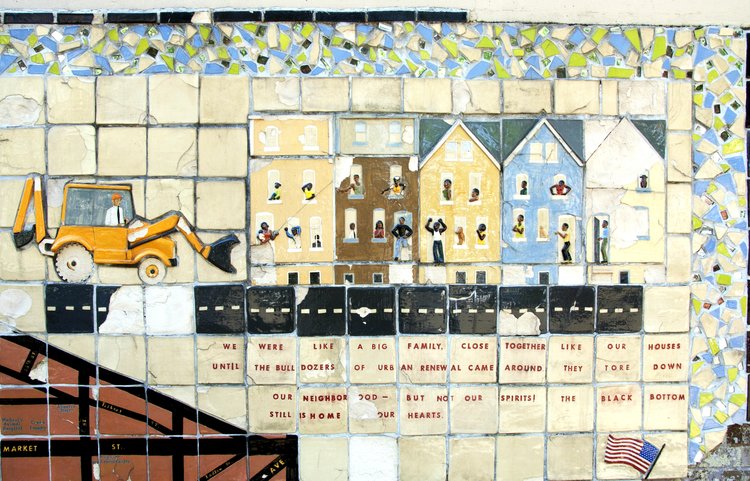For more than 200 years, the 3500 block of Lancaster Avenue has been home to community centers, art spaces, theaters, and residences. The area includes evidence of some of the earliest houses built in West Philadelphia during the 1850s, and a new community archeology project aims to recover forgotten stories of the residents of the historic Black Bottom neighborhood before they were displaced in the 1960s when their homes were demolished to make way for what would become “University City.”
The “Heritage West: The West Philadelphia Community Archaeology Project” is a partnership between several community organizations and institutions, including HopePHL, the Black Bottom Tribe Association, the Community Education Center (CEC), University City Arts League, University of Pennsylvania, and Penn Museum. Using archaeological investigation, archival research, oral histories, and state-of-the-art technology, Heritage West team members are working together to unearth and preserve untold—or erased—histories dating from the 19th century to the present.
The project includes excavation work that follows a geophysical survey conducted by the Heritage West team using Ground-Penetrating Radar (GPR) and Electrical Resistivity (ER). The team had to “look underground” first—before digging. They found promising, evidence-based starting points for the excavation.
Excavation plan
An excavation at the CEC’s site on the 3500 block of Lancaster Avenue will begin on Tuesday, Aug. 1 when the team will test locations in the parking lot and yard behind CEC for two weeks. Following the testing phase, and in consultation with CEC, Heritage West will focus on two areas for further excavation as part of an undergraduate anthropology class, “Archaeology in the City of Brotherly Love,” which starts September 1. The excavation will continue through November 17, 2023.
“CEC is excited to be a part of the project. Our building is over 100 years old, a former Quaker meetinghouse and school, and our community has always been interested in its history—and the history of the Black Bottom,” says Ms. Theresa (Terri) Shockley, CEC’s Executive Director since 2001. “This project helps to bring community members together, hopefully to discover something new.”
Archival records
In addition, Heritage West team members searched archival records, which told stories of early residents like Stonewall and Mary Jones. Born in Virginia in the 1880s, they raised four children in a wood home at 32 N. 35th street in the early 1900s. Another story is about Henry Johnson, who migrated from South Carolina in 1910. He worked as a waiter until he was drafted for World War I in 1917. Excavating the structural remains of their homes just a few feet underneath the surface could yield objects they left behind—and help reconstruct their forgotten histories.
Community involvement
Co-creating projects like Heritage West with community members is a necessary step towards reparative justice, according to project organizers. As marginalized groups advocate for stronger recognition and support, community archaeology uplifts rarely documented stories — with evidence.
“Community participation is essential to every step of this research,” says Dr. Megan C. Kassabaum, Associate Professor of Anthropology at the University of Pennsylvania and Weingarten Associate Curator for North America at the Penn Museum. “From brainstorming to reporting outcomes, this project runs on collaboration and community engagement. To sustain that, we have built in many opportunities for the public to be a part of the project through excavations and events,” she explains. “Keeping our West Philadelphia neighbors involved throughout the process is a critical component to the work.”
To mark International Archaeology Day on October 21, 2023, Heritage West will invite the public to the CEC excavation site and encourage them to visit Penn Museum for free that day.
The team will spend the Spring of 2024 analyzing artifacts recovered from the CEC in Penn Anthropology’s North American Archaeology Laboratory. Community members involved with the excavation will be invited to study the materials, archives, and reference books to learn more—alongside the project directors and students.
“The Lancaster Avenue neighborhoods embody a rich history that everyone in Philadelphia should discover. HopePHL is honored to have played a part in connecting Penn Museum and Community Education Center for this excavation,” said Kathy Desmond, president of HopePHL, “We hope to see many community members participate in the Heritage West activities.”
For more information about the project, visit its website: https://www.heritagewestphl.org.






Recent Comments